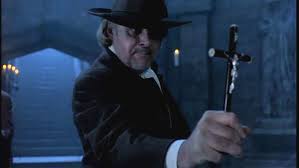It might be hard for us to remember, but all the technologies used in Dracula – the phonograph, the telegrams, the trains, the blood transfusions, the typewriter – were absolutely something new in 1897. But at the same time, there’s something that these new technologies cannot explain and/or be helpful for, Dracula himself. So, this creates a contrast between the science Van Helsing and his crew have on their side with the tradition and superstition governing Dracula’s world – which is actually what they use to defeat him because the formers do not apply to him.
This doesn’t mean though that the good guys aren’t able to use technology to their advantage, they eventually do use it in many cases but it has its limits: for example, the blood transfusions don’t save Lucy’s life, and the telegraph system keeps Seward from getting Van Helsing’s message in time to rush to Lucy. Technology and science seems not to have all the answers.
After a while, Seward and the others actually have to give up their faith in science, logic, and modern science in order to defeat the Count. First of all, they have to accept that vampires exist, and then they have to reconsider Van Helsing’s approach, learning about ancient traditions and superstitions, in order to figure out the way to defeat this creature. Dracula is, after all, ancient, centuries old. He cannot be treated with the Modern World mentality, h e only responds to old and forgotten rules, manners, and weapons.
e only responds to old and forgotten rules, manners, and weapons.
This is not a secret to the reader, Bram Stoker is actually hinting these theories from the very beginning -the further Harker gets from Great Britain, “the center of modern civilization” (in his opinion), the less reliable the trains are and the less reliable his knowledge of how things work is. So, Count Dracula could be seen as the past, and Great Britain (aka the British) as the present – Dracula’s “invasion” of Britain might be a reminder of the way history has on influencing or haunting the present. We should never forget about the past. Dracula, himself, knows that to conquer a new land he must learn everything about it, you cannot be unprepared to what may comes: “Unable to rely on his supernatural powers alone, Dracula prepares himself for his assault on England by mastering reference books that catalog the country’s vital statistic”. He combines the old and then new, a lesson that eventually the British side will learn.
In Chapter XVII, Van Helsing actually teaches and warns Seward that “to rid the earth of this terrible monster we must have all the knowledge and all the help which we can get,” (Dracula, 237) he literally means all the knowledge. Beliefs on the new technology must not be a blind trust. “It is the fault of our science,” he says, “that it wants to explain all; and if it explains not, then it says there is nothing to explain.” (Dracula, 204). Here, Van Helsing states the consequences of subscribing only to contemporary currents of thought. Van Helsing is hence the bridge for both the old and the new world – we should also never forget that he is not British. He later points out that “in this enlightened age, when men believe not even what they see, the doubting of wise men would be [Dracula’s] greatest strength” (339), for it would prevent them from acting against him. Like other late Victorian critics of science, Van Helsing argues that it is really scientists who lack an open mind, since they believe that what they can see and prove constitutes the whole of reality. He dismisses the facts of materialist science as “little bits of truth” that can “check the rush of a big truth, like a small rock does a railway truck” (202). Knowledge, he counsels Seward, must be kept in its place- in the head and the heart- until it can bear fruit (126).